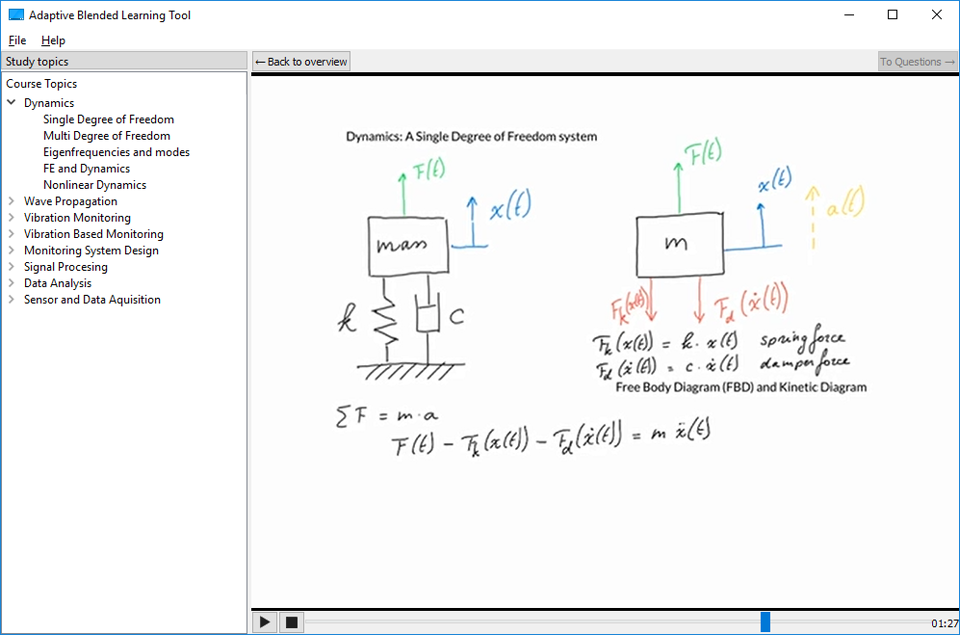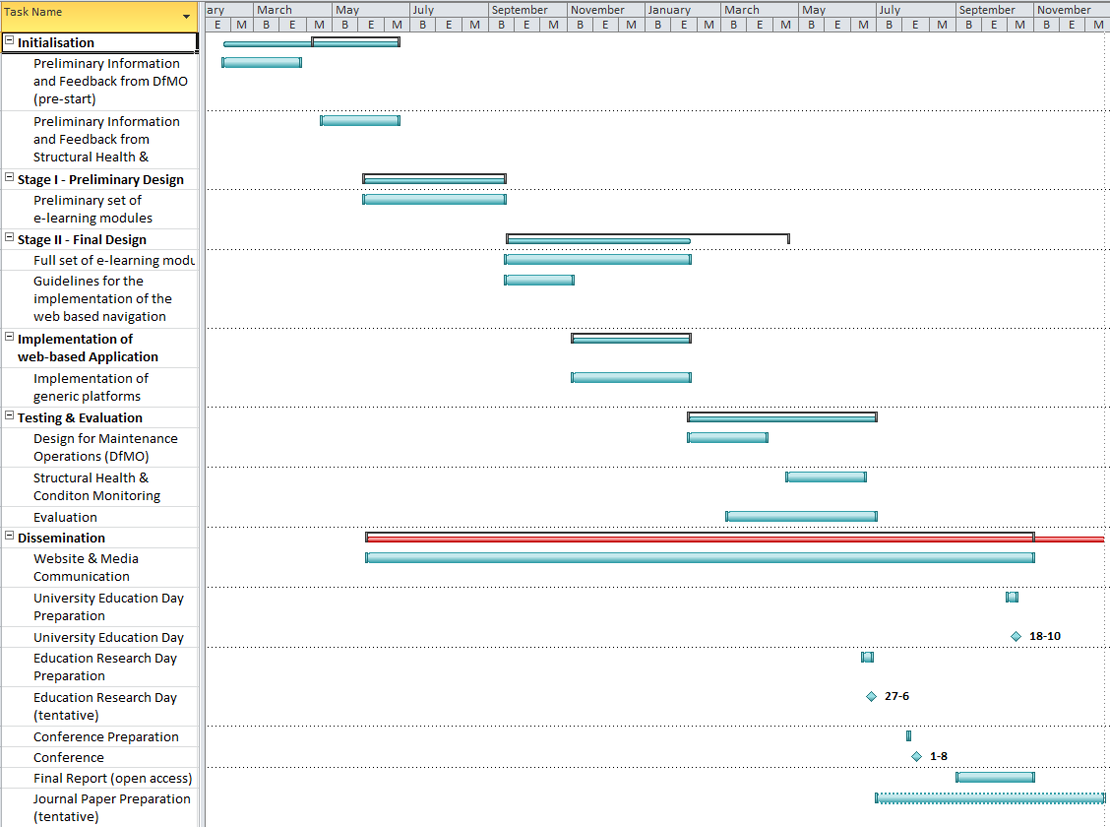NEWS
The first results of our Comenius Project are available! They have been presented to the 15th International CDIO Conference for Engineering Education at Aarhus University as paper titled: "A New Adaptive E-Learning Concept For Multidisciplinary Learning Environments".
You can download here the paper and here the presentation!
ABSTRACT of the paper
Engineering is a broad multidisciplinary discipline, also reflected in the increase of the variety of students in a single academic course in terms of foreknowledge and of interests and skills. Adaptive learning is a powerful tool to achieve tailored education in a multidisciplinary learning environment. Students with a diverse background and even with different levels can work together in a similar learning environment. Without support of e-learning concepts and online tools, this method is however very time consuming and ineffective for the lecturer.
E-learning modules are typically passive, not directly guiding the students. The new concept presented here, actively helps the student to develop their own learning route, based on their needs and interest, yet meeting the course's learning objectives. The overall concept is based on a plenary core set of lectures embedded in a flexible shell of adaptive e-learning modules. These modules are cross-linked allowing the student to step from one topic branch to another, depending on the need or interest identified by a brief end-of-module assessment and earlier information collected by the system.

A basic version of the web-based application to guide students through the network of e-learning modules is tested and showed positive results in terms of student appreciation yet not directly in terms of performance. The latter is the most relevant from a didactic point of view, while the success of the concept heavily relies on the positive student appreciation. The outcome of these first test used as input for the development of the final application.
FORMULATION OF THE PROBLEM
Our ever-changing and developing society constantly requires professions that did not exist twenty years ago. Students have to become professionals capable of steering their own career development and capable of controlling their own learning process, now and in their future profession.
The master track Maintenance Engineering and Operations (MEO), offered by the faculty of Engineering Technology (ET) of the University of Twente and supported by the consortium TIME (Twente is Maintenance Excellence) is a highly multidisciplinary track. It is not, like other tracks, part of a single department, but crosses borders between departments in the faculty and even between faculties: the faculty Behavioural, Management and Social science (BMS), research group Industrial Engineering and Business Information Systems (IEBIS), also contributes to the track.
SUMMARY
Adaptive learning is a powerful tool in a multidisciplinary learning environment, in which students with a diverse background and foreknowledge and with different levels (MSc and post-MSc) work together. In essence, students can follow a learning route, tailored to their individual needs and interest. Without support of e-learning concepts and online tools, this method is however very time consuming and ineffective for the lecturer. A new concept is proposed here for the development of master courses with a diverse influx and a multidisciplinary content. The concept is based on a plenary core set of lectures embedded in a flexible shell of adaptive e-learning modules. The concept will be relying on a web-based application to guide students through the network of e-learning modules, follow their progress and allow feedback to the students. The concept will be tested in two courses of the MSc track Maintenance Engineering and Operations (MEO), which is characterised by a multidisciplinary content and student population. MEO is not part of a single department, like other MSc tracks, but is supported by four departments, and two faculties. The track courses are also followed by students from other tracks and PDEng and PhD students.
PROJECT PLAN
A variety of methods and new concepts will be used and developed, changing he current method of lecturing drastically, which is a risky operation. Therefore, the project is divided in phases.
Phase 1: Initialisation
This phase comprises of a literature review to collect detailed information on the state of the art of the methods that are anticipated to be used. The deliverable of this phase is an overview of all methods, including characteristics and applicability.
Phase 2: Stage I - Preliminary Design
A preliminary design will be developed in this phase, containing a limited set of e-learning modules. The limitations concern the number of course topics (one or two) for which modules will be made, the extent of their adaptiveness and the variation in levels (low level: fixing knowledge gaps; high level: additional material, beyond learning objective of course).
The implementation of the online web-based navigation and selection application is not included. However, the design will be tested in the course SHCM, to generate feedback from students and educational advisors involved. The deliverable is a basic concept design, including a list of requirements based on theoretical analysis and the evaluation of the
Phase 3: Stage II - Final Design
A final design will be developed based the preliminary design results and further increasing the number of e-learning modules and the extent of their adaptiveness. The links between the modules will be extended and guidelines for the technical implementation for the web-based application will be formulated. The deliverables are:
1. A complete set of adaptive e-learning modules;
2. A set of guidelines;
Phase 4: Implementation of the web-based application
The actual implementation of the web-based application will be executed in this phase. A strong collaboration with the ICT department is necessary and the deliverable of the previous phase is a crucial input. Generic platforms, such as Moodle, and interfaces, such as Blackboard or Canvas, will be used to ensure a generic application that will remain functional in future generation operation systems and/or interfaces. The deliverable is a web-application, with the functionalities defined in previous phases.
Phase 5: Testing & Evaluation
The concept will be tested in two courses: Design for Maintenance Operations (DfMO) and Structural Health & Condition Monitoring (SHCM). A real time monitoring is foreseen, relying on the built-in feedback functionalities, including Learning Analytics methods, as well as on feedback from students and educational experts. The latter is also done after the results of the course are known. A mutual comparison of the evaluations of both courses is used to generalise the concept and identify general rules and guidelines for the implementation of the concept. The deliverable is an evaluation report, including recommendations and guidelines for generalisation.
Phase 6: Dissemination
Details of the dissemination activities can be found in the section on dissemination. The deliverables are:
1. Workshop contributions
2. Conference/journal papers
3. Report (online)

CONNECTED PROJECTS
The project is connected to a second grant funded by the Center of Engineering Education (CEE) of the 4TU for the development and evaluation of two adaptive e-learning modules which will complement and apply the present Comenius teaching fellow project.
Moreover, the Grant Holders received a financial contribution from the Faculty of Engineering Technology of the University of Twente for supporting this educational initiative.
DISSEMINATION
PUBLICATIONS
Loendersloot R., Martinetti A. (2019). A New Adaptive E-Learning Concept For Multidisciplinary Learning Environments, 15th International CDIO Conference for Engineering Education, Aarhus (Denmark), 24-28 June 2019.
CONTACT
Dr.ir. Richard Loendersloot - Associate Professor in Dynamic-Based Maintenance (DBM) - r.loendersloot@utwente.nl / NH118
Dr.ir. Alberto Martinetti - Assistant Professor in Maintenance Engineering - a.martinetti@utwente.nl / WH247
USEFUL LINKS AND REFERENCES
Comenius Programme, Nationaal Regieorgaan Onderwijsonderzoek, Center for Engineering Education, CDIO
- Asarta, C. J., & Schmidt, J. R. (2017). Comparing student performance in blended and traditional courses: Does prior academic achievement matter? Internet and Higher Education, 32, 29–38. https://doi.org/10.1016/j.iheduc.2016.08.002
- Boelens, R., De Wever, B., & Voet, M. (2017). Four key challenges to the design of blended learning: A systematic literature re. Educational Research Review, 22, 1–18.
- Boud, D., Cohen, R., & Sampson, J. (2014). Peer learning in higher Education: Learning from & with each other. Psychology Press, 2001.
- Cloutier, G., Hugo, R., Sellens, R. (2011). Mapping the relationship between the cdio syllabus and the ceab graduate attributes: an update. Proceedings of the 7th International CDIO Conference, Technical University of Denmark, Copenhagen, June 20 - 23, 2011.
- Freeman, S., Eddy, S. L., McDonough, M., Smith, M. K., Okoroafor, N., Jordt, H., & Wenderoth, M. P. (2014). Active learning increases student performance in science, engineering, and mathematics. Proceedings of the National Academy of Sciences, 111(23), 8410–8415. https://doi.org/10.1073/pnas.1319030111.
- Gikandi, J. W., Morrow, D., & Davis, N. E. (2011). Online formative assessment in higher education: A review of the literature. Computers & Education, 57, 2333–2351.
- Jovanović, J., Gašević, D., Dawson, S., Pardo, A., & Mirriahi, N. (2017). Learning analytics to unveil learning strategies in a flipped classroom. Internet and Higher Education, 33, 74– 85. https://doi.org/10.1016/j.iheduc.2017.02.001 Kamardeen, I. (2014). Adaptive e-Tutorial for Enhancing Student Learning in Construction Education. International Journal of Construction Education and Research, 10(2), 79–95. https://doi.org/10.1080/15578771.2012.756437
- Marković, S., Jovanović, Z., Jovanović, N., Jevremović, A., & Popović, R. (2013). Adaptive distance learning and testing system. Computer Applications in Engineering Education, 21(S1), E2–E13. https://doi.org/10.1002/cae.20510
- Martinetti, A., Parada Puig, J. E., Oude Alink, C., Thalen, J., & van Dongen, L. A. M. (2017). Gamification in teaching maintenance engineering: a Dutch experience in the rolling stock management learning - Paper presented at 3rd International Conference on Higher Education Advances, HEAd 2017, València, Spain.DOI: 10.4995/HEAd17.2017.5332.
- Oude Alink, C., Martinetti, A., Karahanoglu, A., & Hahnen-Florijn, M. E. (2018). Non-Natural Born lecturers: How to survive teaching in Dutch higher education - 1227-1235. Paper presented at 4th International Conference on Higher Education Advances, Valencia, Spain.DOI: 10.4995/HEAd18.2018.8177.
- Padhi, A., Rajasekhara Babu, M., Jha, B., & Joshi, S. (2019). An IoT Model to Improve Cognitive Skills of Student Learning Experience Using Neurosensors. In Internet of Things and Personal Healthcare Systems (SpringerBr). Springer Singapore.
- Richmond, E. (2014). Student-Centered Learning. Retrieved January 27, 2019, from https://edpolicy.stanford.edu/news/articles/1193 Rovai, A. P., & Jordan, H. M. (2004). Blended Learning and Sense of Community: A comparative analysis with traditional and fully online graduate courses. International Review of Research in Open and Distance Learning, 5(2), 13.
- Song, L., Singleton, E. S., Hill, J. R., & Koh, M. H. (2004). Improving online learning: Student perceptions of useful and challenging characteristics. Internet and Higher Education, 7(1), 59–70. https://doi.org/10.1016/j.iheduc.2003.11.003
- Yorke, M. (2003). Formative assessment in higher education: Moves towards theory and the enhancement of pedagogic practice. Higher Education, 45, 477–501.
